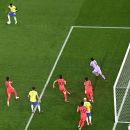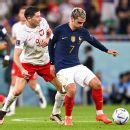2022 World Cup ‘Moment of the Day’: when Portugal’s team sheet confirmed Ronaldo being benched
Portugal #Portugal

The 2022 World Cup now enters its quarterfinals. The final day of the round-of-16 was as exciting and dramatic (if not more) than those that preceded it. With so much happening on the day, ESPN India attempts to pick out the one moment that defined the day’s action.
For day 16, we pick a moment that happened off-the-field: when Portugal’s team sheet dropped… and Cristiano Ronaldo’s name wasn’t in the playing XI.
Rumours had been floating about before the match. A report from a Portuguese media outlet had added weight to it. But surely they were not correct. Surely it was just the overzealous imagination of someone who had got carried away by Fernando Santos’ statements ahead of the match? Then, at 11.14 IST, came the tweet.

1dAnirudh Menon

2dAnirudh Menon

3dAnirudh Menon
2 Related
Portugal’s starting XI vs Switzerland: Diogo Costa. Diogo Dalot. Pepe. Ruben Dias. Raphael G. William Carvalho. Otavio. Bruno Fernandes. Bernardo Silva. Joao Felix… Goncalo Ramos.
An hour and 16 minutes before kickoff on Tuesday’s second match, we already had the moment of the day: the announcement that Cristiano Ronaldo had been dropped.
Portugal had not won a knockout match at the World Cup since 2006 (when they basically kicked the Netherlands a little less than they were kicked). All eyes were on this final round-of-16 tie of 2022. High-pressure didn’t even begin to describe it. And yet here we were.
For the first time in a key match at a major tournament since the group stages of Euro 2004, the name Ronaldo wasn’t on a Portugal starting XI. Everything that followed on the night was a direct consequence of this.
To put into context what we saw on that Lusail stadium pitch, we must remember just how awful a watch Portugal have been for the past decade and a half. It’s been particularly jarring considering that this time period has coincided with the prime of one of the greatest footballers to play the game. Almost as jarring now is the fact that without him on the pitch, Portugal were a transformed team.
First, the obvious. Goncalo Ramos was spectacular, to put it mildly. The Ronaldo replacement — a 21-year-old making his first start EVER for Portugal — scored the kind of goals Ronaldo used to oh, so often. A swivel and an unexpected blast into the roof at the near post. A darting run in front of the defender, the ball tucked in with a deft little flick. Running in behind the back of the last man to go one-on-one and cheekily chipping just over the advancing keeper. Santos had taken a massive gamble by starting Ramos in a game of this magnitude — what he had got in return was the youngest (men’s) hat-trick scorer a World Cup knockout game had seen since some Brazilian kid called Edson Arantes de Nascimento.
With Ramos leading the line, Portugal played the kind of high-tempo, quick-passing, fluid-position football purists dream about. Ramos’ running, intelligence and relentlessness stretched the game and opened up space for the trio of Joao Felix, Bernardo Silva and Bruno Fernandes behind him. We had yet to see the true technical brilliance of these three combining, but when it finally came about the football was just as most thought it would be: sexy.
Pepe, captain in his great mate’s stead, was a monstrous presence and thundered home one from a corner. Raphael Guerreiro smashed one in after a move of quite stunning simplicity and speed — set up by an unselfish first-time touch around the corner by Ramos. It was the kind of move, the kind of liquid football, Portugal had been teasing for years.
The goals scored on the night had come from this freedom. Of thought and of movement. What happens when you take out one of the most prolific goalscorers the game has known is that everyone else doesn’t feel constantly obliged to serve him. Outlets were found across the pitch. Fearlessness infected everyone. Shots were taken without second thought, passes pinged without worry. The attacking midfield triumvirate darted hither and thither, working the ball forward in passing triangles of dizzying pace and precision. The fullbacks pelted forward. The press from the front was coordinated, the falling-back-as-a-unit disciplined. The difference between their group stage performances and this… immense. And that against the best team they’d faced in the tournament.
When Ronaldo was finally brought on, the stadium exploded. The game had been decided by then, but a decibel count was hit that far exceeded anything else at any point previously — a reminder of his pure box-office appeal, of how vast a shadow he still casts off-the-pitch.
In an almost cruel twist, though, the twenty one minutes he spent on-the-pitch served as a perfect contrast to what had come before him on the night. A freekick was hit into the wall. A long-ball was miscontrolled inside the box. A one-on-one opportunity was missed after he lost a foot-race with a defender. A neat finish was ruled out, the timing on his run off by several yards. All of a sudden, the football had started jarring again.
Portugal did score when Ronaldo was on the pitch, but it had little to do with him, Rafael Leao curl-smashing one in from range, that endearing smile lighting up the Doha sky as he let fly.
After the match, Santos would say, “There is no problem with our captain. We’ve been friends for years. We spoke before the game and he had no issue with my decision. He’s an example.” Santos knows that to make a deep run into the tournament he’ll need every resource he has, and there are few better than a potential super-sub with 819 goals in the bank. So he would say that it had been a strategic choice to start with Ramos. That he was just a different player. Now that he’s seen just what the true ceiling of his team can be, though, the question remains if he’ll stick with it.
If he does, the moment that defined this day could well go on to define this whole tournament.